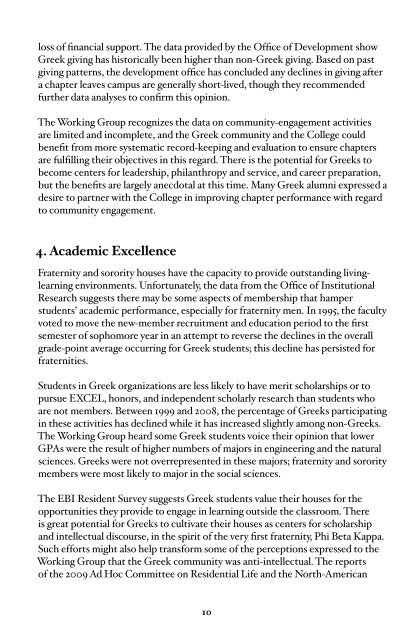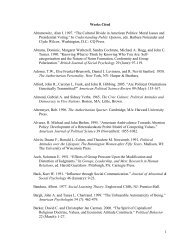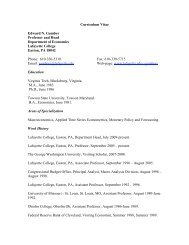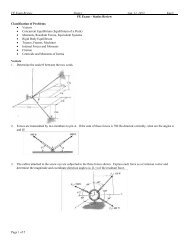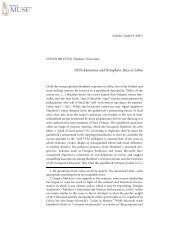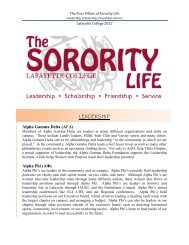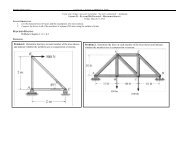GREEK LIFE AND CAMPUS COMMUNITY - Sites at Lafayette ...
GREEK LIFE AND CAMPUS COMMUNITY - Sites at Lafayette ...
GREEK LIFE AND CAMPUS COMMUNITY - Sites at Lafayette ...
You also want an ePaper? Increase the reach of your titles
YUMPU automatically turns print PDFs into web optimized ePapers that Google loves.
loss of financial support. The d<strong>at</strong>a provided by the Office of Development showGreek giving has historically been higher than non-Greek giving. Based on pastgiving p<strong>at</strong>terns, the development office has concluded any declines in giving aftera chapter leaves campus are generally short-lived, though they recommendedfurther d<strong>at</strong>a analyses to confirm this opinion.The Working Group recognizes the d<strong>at</strong>a on community-engagement activitiesare limited and incomplete, and the Greek community and the College couldbenefit from more system<strong>at</strong>ic record-keeping and evalu<strong>at</strong>ion to ensure chaptersare fulfilling their objectives in this regard. There is the potential for Greeks tobecome centers for leadership, philanthropy and service, and career prepar<strong>at</strong>ion,but the benefits are largely anecdotal <strong>at</strong> this time. Many Greek alumni expressed adesire to partner with the College in improving chapter performance with regardto community engagement.4. Academic ExcellenceFr<strong>at</strong>ernity and sorority houses have the capacity to provide outstanding livinglearningenvironments. Unfortun<strong>at</strong>ely, the d<strong>at</strong>a from the Office of InstitutionalResearch suggests there may be some aspects of membership th<strong>at</strong> hamperstudents’ academic performance, especially for fr<strong>at</strong>ernity men. In 1995, the facultyvoted to move the new-member recruitment and educ<strong>at</strong>ion period to the firstsemester of sophomore year in an <strong>at</strong>tempt to reverse the declines in the overallgrade-point average occurring for Greek students; this decline has persisted forfr<strong>at</strong>ernities.Students in Greek organiz<strong>at</strong>ions are less likely to have merit scholarships or topursue EXCEL, honors, and independent scholarly research than students whoare not members. Between 1999 and 2008, the percentage of Greeks particip<strong>at</strong>ingin these activities has declined while it has increased slightly among non-Greeks.The Working Group heard some Greek students voice their opinion th<strong>at</strong> lowerGPAs were the result of higher numbers of majors in engineering and the n<strong>at</strong>uralsciences. Greeks were not overrepresented in these majors; fr<strong>at</strong>ernity and sororitymembers were most likely to major in the social sciences.The EBI Resident Survey suggests Greek students value their houses for theopportunities they provide to engage in learning outside the classroom. Thereis gre<strong>at</strong> potential for Greeks to cultiv<strong>at</strong>e their houses as centers for scholarshipand intellectual discourse, in the spirit of the very first fr<strong>at</strong>ernity, Phi Beta Kappa.Such efforts might also help transform some of the perceptions expressed to theWorking Group th<strong>at</strong> the Greek community was anti-intellectual. The reportsof the 2009 Ad Hoc Committee on Residential Life and the North-AmericanInterfr<strong>at</strong>ernity Conference Fr<strong>at</strong>ernity and Sorority Coalition Assessment Projectrecognized the value of living-learning communities on college campuses. TheGreek community would benefit from refocusing its efforts on academicexcellence and supporting the academic mission of <strong>Lafayette</strong> College.5. Personal Integrity and ResponsibilityConduct and Social Living GroupsThe issue of group and individual responsibility for viol<strong>at</strong>ions of the Code ofConduct has been one of the most contentious issues faced by the WorkingGroup. The amount of historical d<strong>at</strong>a a dean or committee considers regardinggroup conduct history is an ongoing source of deb<strong>at</strong>e.In the spring of 2010 the College invited a consultant to review the Code ofConduct and to address this conflict specifically. Dr. John Wesley Lowery spenttime reviewing the document and also speaking with members of the campuscommunity. In evalu<strong>at</strong>ing conduct m<strong>at</strong>ters, decisions must be made about groupversus individual responsibility. Dr. Lowery made reference to a chapter fromthe 1992 book Rights, Freedoms and Responsibilities: A Continuing Agenda edited byRichard Mullendore and William Bryan. The chapter, written by Joe Buchananand D. Parker Young (p. 84), outlines six general principles of group responsibility.The six principles are as follows:1. Members of the group act in concert to viol<strong>at</strong>e university standards ofconduct.2. A viol<strong>at</strong>ion arises out of a group sponsored, financed, or endorsed event.3. A group leader(s) has knowledge of the incident before it occurs and fails totake corrective action.4. The incident occurs on the premises owned or oper<strong>at</strong>ed by the group.5. A p<strong>at</strong>tern of individual viol<strong>at</strong>ions is found to have existed without proper andappropri<strong>at</strong>e group control, remedy, or sanction.6. Members of a group act in concert, or the organiz<strong>at</strong>ion provides the impetus(probable cause) for viol<strong>at</strong>ion of university rules and regul<strong>at</strong>ions.Although more than a decade old, this paradigm of assigning group responsibilityfor individual behaviors is still applicable. The authors are clear to pointout organiz<strong>at</strong>ions are responsible for the actions of their members and the10 11


